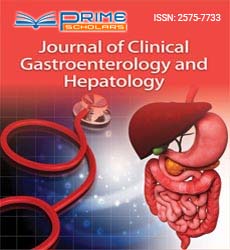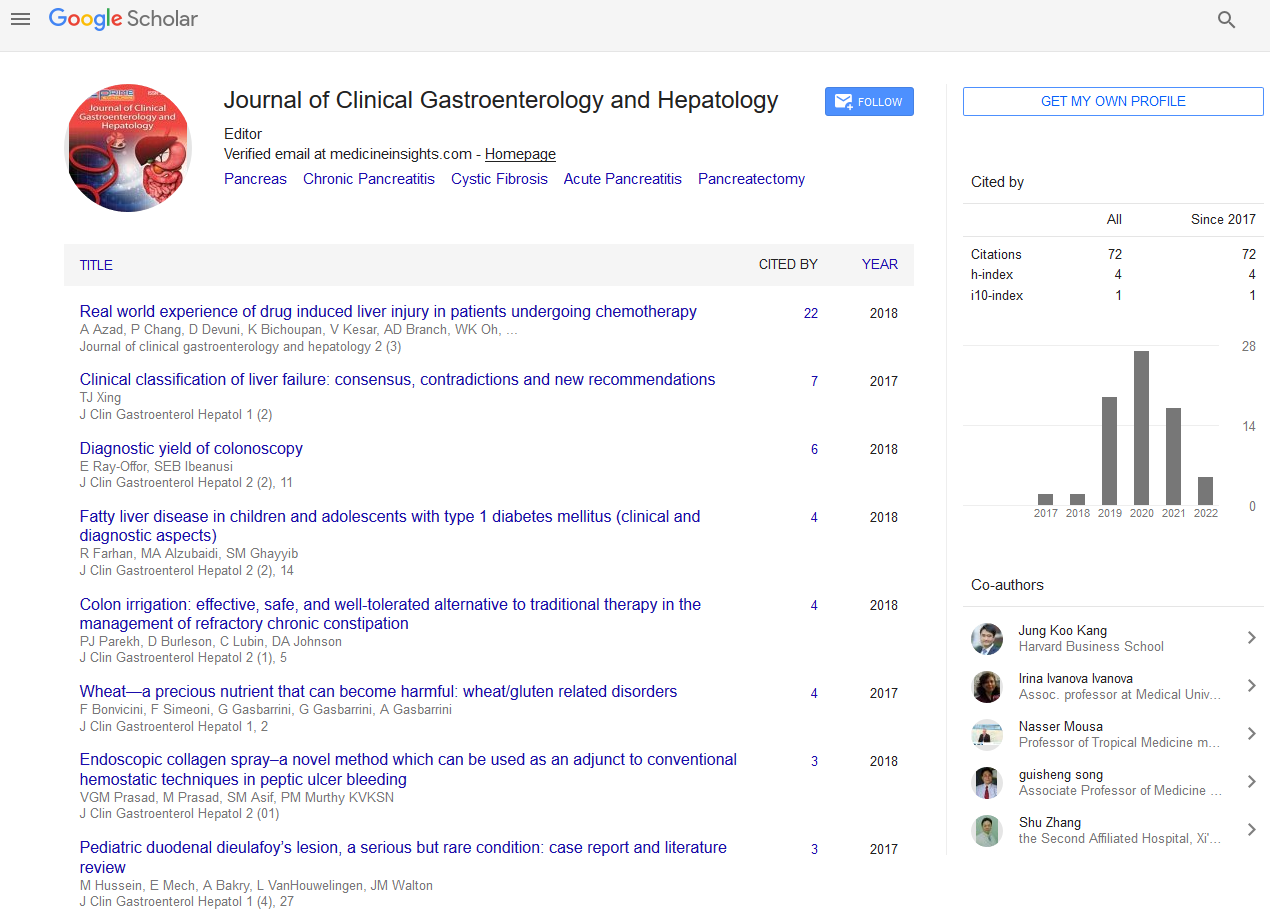Natasha Bollegala*
Department of Medical and Health Sciences, University of Milan, Milan, Italy
- *Corresponding Author:
- Natasha Bollegala
Department of Gastroenterology
Marche Polytechnic University
Ancona, Italy
E-mail: natashaB@gmail.com
Received Date: October 04, 2021; Accepted Date: October 18, 2021; Published Date: October 25, 2021
Citation: Bollegala N (2021) Role of Aspirin in Gastrointestinal Ulcers. J Clin Gastroenterol Hepatol. Vol.5 No.2:e005.
Description
Aspirin use is associated with gastro duodenal mucosal
damage and increased risk of upper Gastrointestinal (GI)
bleeding. Many aspirin users should receive prophylactic
treatment since they often have several risk factors for upper GI
complications. The nice healing technique for lowering GI
toxicity in low-dose aspirin customers remains ill-described as
just a few researches have cantered in this problem. Omeprazole
seems to be very powerful in lowering each acute
gastroduodenal mucosal harm and top GI bleeding with inside
the high-threat affected person taking low-dose aspirin,
however information with different anti-ulcer marketers are
lacking (misoprostol) or inconsistent (ranitidine) at gift. The
position of Helicobacter pylori is debatable in NSAID users;
however there may be now huge settlement that H. pylori
contamination will increase mucosal harm and the threat of
higher GI bleeding in low-dose aspirin customers.
Aspirin-induced ulcers
Aspirin is most of the maximum broadly used medicinal drugs
and is run for an in depth sort of indications. Further, it's miles
quite simply to be had over the counter. Aspirin originated as a
medicinal drug to deal with ache and inflammation, however
because of its antiplatelet properties, it has developed right into
a drug usually used to save you cardiovascular ailment. Standard
doses of aspirin starting from 500 to 1,000 mg day by day are
mainly prescribed for inflammatory situations and ache relief,
while doses among seventy five and 325 mg day by day are
commonly prescribed as antiplatelet remedy for number one
and secondary prevention of cardiovascular and cerebrovascular
occasions.
Major threat elements for top GI occasions related to aspirin
use encompass a records of peptic ulcer or bleeding ulcer,
concomitant use of different NSAIDs or antithrombotic and H.
pylori contamination Other elements that can boom the threat
of peptic ulcers are smoking, immoderate alcohol intake, drug
use, and emotional stress. These elements are taken into
consideration to be environmental, as they make a contribution
to ulcer formation via way of means of growing gastric acid
secretion, in the end ensuing in a weakened mucosal barrier.
How does aspirin cause gastric ulcers?
Pain relievers along with aspirin intervene with the stomach
cap potential to defend it from destructive acids. These NSAIDs
sell ulcers via way of means of disrupting the mucus that coats
the belly lining, and via way of means of annoying different
herbal defences in opposition to digestive juices.
Ulcer diagnosis
Several signs and symptoms are related to the prognosis of
ulcers, which include epigastric ache, fullness, bloating, untimely
satiety, weight loss, and nausea. In a few cases, those signs and
symptoms are related to different illnesses, along with
gastroesophageal reflux ailment, standard dyspepsia, or
gastritis, which makes assessment extra challenging.
Asymptomatic ulcers may work undetected till medical
presentation of a GI bleed. Physicians, who include cardiologists,
can be blind to the prevalence of asymptomatic ulcers in
sufferers taking LDA for aerobic safety, as those sufferers do now
no longer gift with medical symptoms and symptoms or worries
after starting the aspirin regimen. Awareness of PUD threat
elements might also additionally assist clinicians to pick out
sufferers at threat for ulcer formation and provoke suitable
gastric safety remedy.
Prevention of Aspirin-Related Gastric Ulcers
The use of low-dose aspirin withinside the prevention of
cardiovascular ailment is regularly related to an improvement of
dyspeptic signs and symptoms and erosions or ulcerations with
inside the top GI tract. Eradication of Helicobacter pylori and
protection remedy with Proton Pump Inhibitors (PPIs) are
powerful withinside the prevention of aspirin-triggered GI
lesions. The cappotential position of H2-receptor antagonists
after the restoration of aspirin-triggered ulcers or erosions is
unclear. Practice moderation. Heavy intake of alcohol and has
been proven to make a contribution to the improvement of
ulcers, so preserve your consumption to a minimum. Take
Nonsteroidal Anti-Inflammatory Drugs (NSAIDS which include
aspirin) with food, as this may decrease your risk of irritating the
lining of your stomach.
Conclusion
PPI therapy reduces the risk of developing gastric or duodenal
ulcers in patients without pre-existing gastro duodenal ulcers. However, this risk is significantly increased in both patients who
are ingesting anticoagulants and patients with diabetes. These
results may help identify patients who require intensive
prophylaxis against aspirin-induced ulcers. Further studies are necessary to clarify the indication of treatment with PPIs for
preventing NSAID or LDA induced peptic ulcers in patients
without a history of peptic ulcers.

